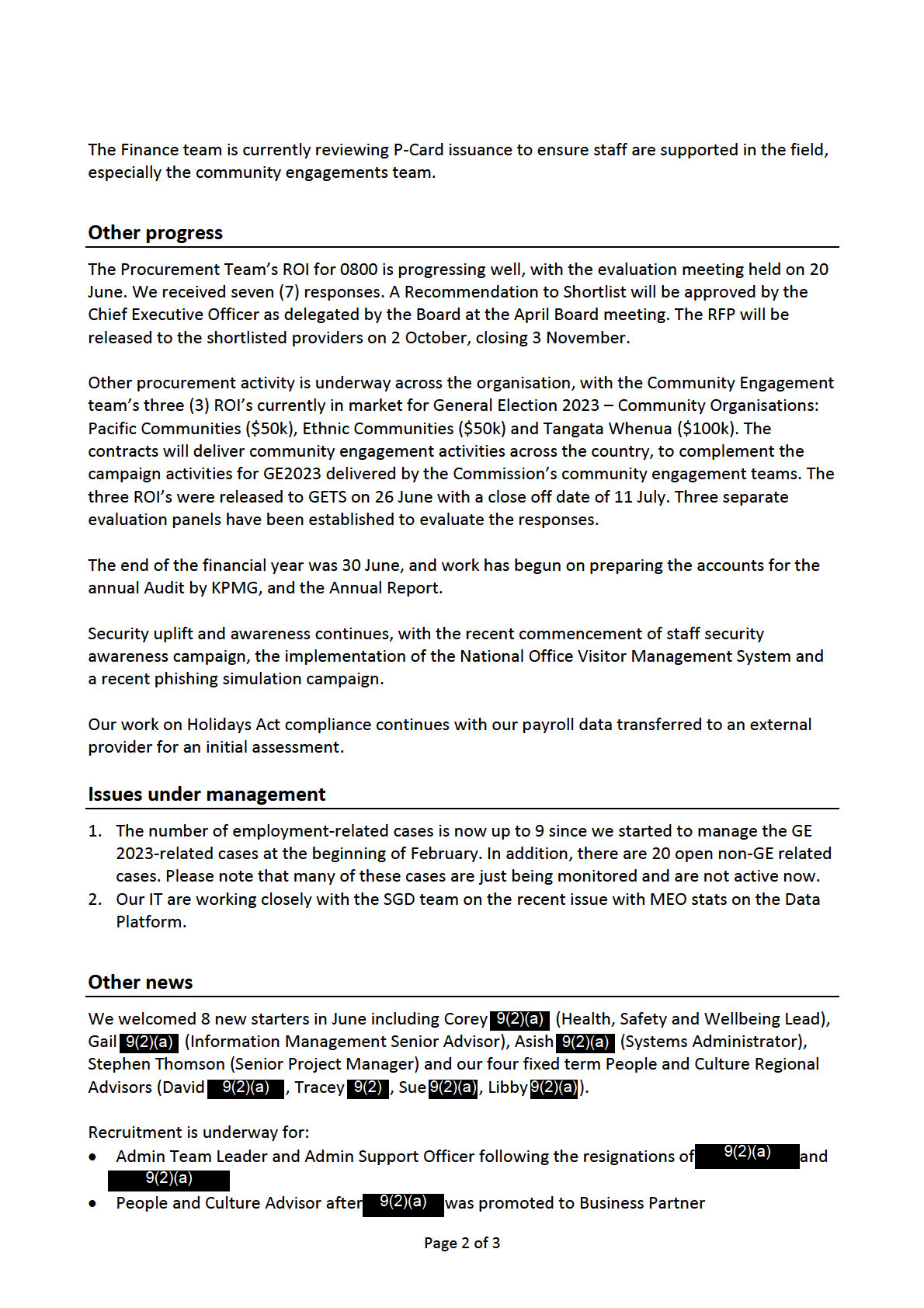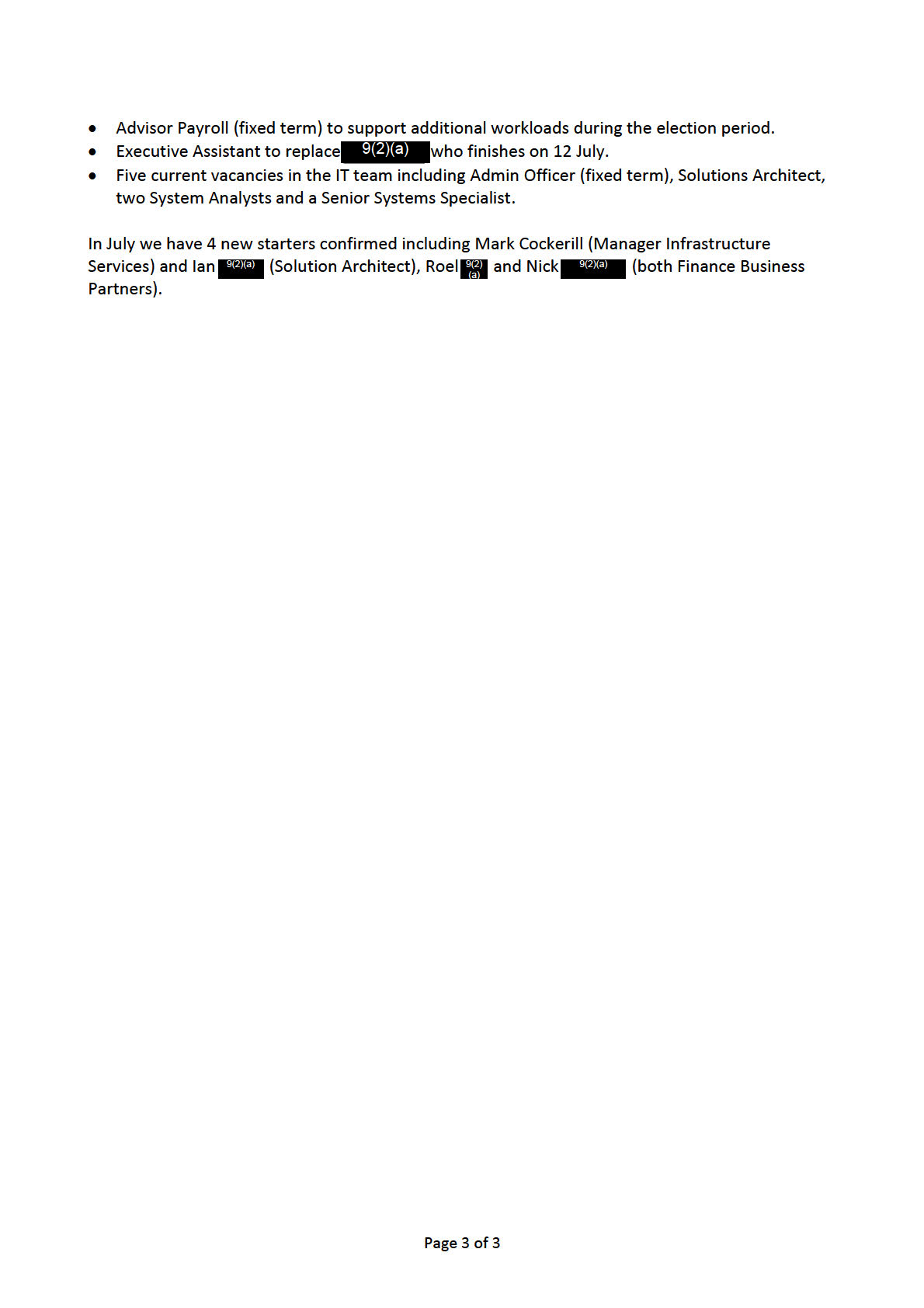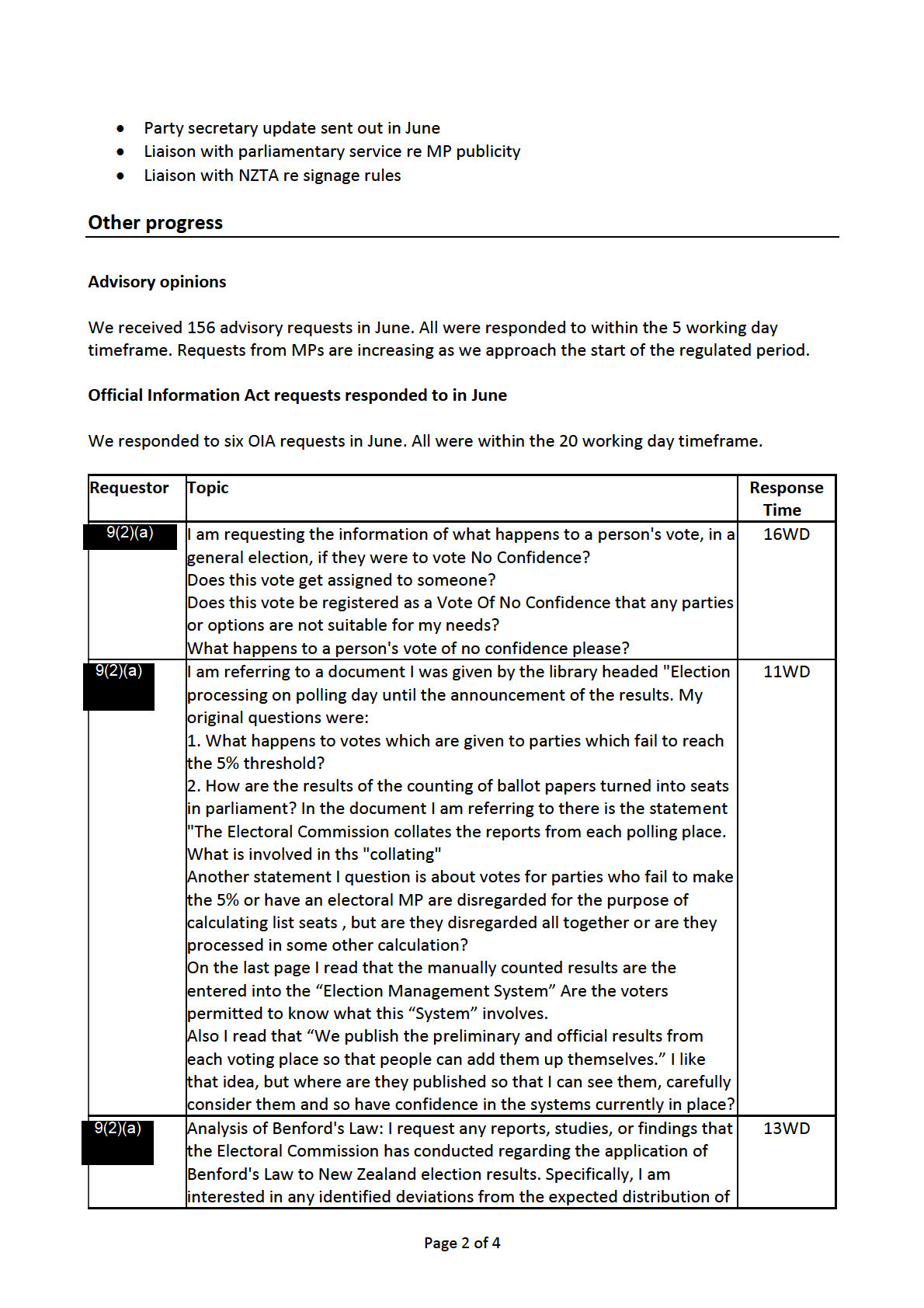
Work to ensure teams have the tools they need to do their jobs continues and we have been
working on the development of many posters, brochures, talking points, presentations and more.
Preparing for an election (note: do not report on activity that is within scope of the GE23
Programme or by-elections)
Karl and the Board visited a number of voting places across the region from Auckland, Napier,
Lower Hutt (Overseas) to Christchurch to understand RMs and EMs election preparedness,
challenges and opportunities within each region.
Karl, Anusha, Martin Rogers and Anne Smith visited the GE23 Enrolment Processing Centre in
Christchurch, to gauge preparedness for the GE23 Elector Enquiry.
The DCE presented to ELT and the Board on the General Election Delivery Taskforce. Post June
Board meeting, we’re in the process of setting up the process (structure) across the organisation
and will have trial runs before activating the Taskforce in September (Writ Day). On-going
discussion around the type of information for the dashboard that is required for the Taskforce.
Extraction and QA of data from MIKE for the enrolment component of the GE23 Enrolment Update
Campaign has been successful. A total of 3.4m enrolment packages were sent to NZ Post for the
production of enrolment updates packs to go out to all enrolled electors.
Successful training rehearsals and train the trainer sessions have been completed for the GE23
Enrolment and Customer Services Team Leader training, and for the enrolment processing
training.
Enrolment teams continue to work closely with the Project Team and GETP to ensure the
technology required for the three enrolment processing centres is set up and working. This
includes laptops, scanners, printers, bar code readers, and of course the supporting software.
These activities were supported by the Business Enablement team as part of the GE preparation.
Team Leader recruitment for all Enrolment and Customer Service roles has been completed and
contracts signed. Recruitment assessment centres for all enrolment and customer service roles
have also been completed in June. The agency recruitment and Snaphire processes were
supported by the Business Enablement team. Fun fact: Of the eight team leaders we have
contracted for GE23, 7 worked as team leaders on the Census! That relationship is bearing fruit.
Updates of the MIKE from the NZ Post Postal Address File (PAF) were completed in time for the
Enrolment Updated pack data extraction. This ensures (as much as possible) that the elector
address in MIKE match NZ Post address protocols. Prior to the PAF update we were at 98.5%
address accuracy.
The BAU training, FAQS and knowledge base for Telnet staff have been reviewed and refreshed to
support the two weeks between the MEO and GE23 campaigns.
SEP has shared the overarching engagement plan with the OLT and Māori Advisory Team for
feedback and delivered a high-level overview to both the Programme Board and Commission
Board.
Page 2 of 7
Planning for the training of the 40 new temp staff for GE23 is nearing completion with delivery
expected in mid-July. Alongside important information on the operations of the Commission,
content will include community panels, Yavu training delivered by MPP, de-escalation training and
inter-cultural awareness online training.
The operationalisation of the complaints/requests process has been further advanced in staff
training and Zendesk readiness. The Customer Services team will work with Carol to finalise the
escalation pathway and EC reporting. The forecast of complaints volume across the Commission
has been prepared to support the discussion.
The Customer Services team met with Security Advisor to discuss the proposed approach to
handling the highly sensitive contacts. These include threats to voting places, threats of
aggression, violence or other inappropriate behaviours, self-harms, persistent swearing, etc that
are received via phone, email or webform. Further work is underway to finalise escalation
pathway and ensure alignment to EC reporting mechanism.
Māori Electoral Option
The final phase of the Māori Electoral Option public information and education programme
started on 25 June and ends on 13 July. It increases urgency to change rolls if you want to for this
year’s General Election by letting people know that that time is running out.
A new television ad in partnership with TVNZ and Whakaata Māori, featuring with Tāmati Rimene-
Sproat, went live in mid-June. Partnership content with Stuff’s Pou Tiaki, interviewing two young
people about why they chose the roll they’re on, was prepared for publication in early July.
A range of new activities upweighting messages to rangatahi went live in May or prepared for the
last two weeks of the campaign. These include Mai FM presenters broadcasting messages about
the Māori Electoral Option, a new radio ad featuring their popular morning presenters K’Lee and
Fame, and a series of five new videos rolling out across their social media channels.
Tik Tok content has been produced with social media influencers Te Aorere Pewhairangi and
Jaedyn Randell. In addition, two new ads for Tik Tok are in production. In the first few days, our Tik
Tok video with Te Aorere Pewhairangi had more than half a million views.
New media placements, targeting rangatahi, were added to the media schedule for the State of
Origin league game and billboards outside Mt Smart Stadium for the upcoming Warriors game.
Communications and education supported community engagement by promoting our teams’
attendance at events in cyclone affected areas and working with Mai FM for their Street Team join
us at the Ōtara
Vote Day event and radio announcers encouraging people to come down and talk
to us about the Option.
The SEP team have been focused on regional engagement activity through the latter part of June
with hui planned across the Upper and Lower South regions including various community groups
and Marae in the region.
Page 3 of 7
Feedback is being gathered from both contracted providers and MEO temporary staff regarding
the delivery of the campaign and suggestions on what future MEO work may look like. A full SEP
MEO debrief is planned for 11 July. We are also considering options for gathering stakeholder
perspectives.
The Special Vote Declaration process for the MEO exception period has been successfully
implemented in MIKE in mid-June.
Election Access Fund
The second phase of radio advertisements for the Election Access Fund commenced for two weeks
beginning on 25 June, on digital platforms as well as commercial and community radio networks.
Social media advertising is ongoing.
In addition handbooks, posters and a letter about the Fund have been sent out to key
stakeholders to help further raise awareness.
Preparing for the future
Zendesk system changes and improvements have been developed, tested, and implemented into
the Production environment successfully on Sunday the 2nd of July. To support the embedment,
we simplified the Zendesk interface, streamlined system logic and request grouping, improved
reporting, and updated support guidance. All users have been involved and communicated in the
process to ensure a smooth transition. The development of an ongoing support model and
enhancement prioritisation is underway.
Building relationships and understanding
Media There was regular and widespread coverage of the Māori Electoral Option during June, with a
focus on the numbers of electors changing rolls and the 13 July deadline for enrolled voters to
change rolls before the election. A media release reminding people of the deadline was issued on
26 June. Over the course of the month, stories have appeared on Stuff, the Herald, on Newshub
Nation, Radio NZ, Radio Waatea, and several regional newspapers around the country. Hone
Matthews was interviewed by RNZ and Waatea.
Media training was provided to te reo Māori speakers in our community engagement teams from
Whangārei, Gisborne, Napier, Rotorua, Hamilton and Taranaki to support opportunities for local
iwi radio interviews. Interviews have taken place in Rotorua, Napier and Ruatoria helping increase
our reach into Māori communities.
Stories related to the work of the Electoral Commission include detailed reports on Stuff and the
Herald on donations to political parties. The source for stories is the returns page on the
Commission’s website. We continue to receive enquiries about election advertising and on 8 June,
Kristina Temel was interviewed by Seven Sharp on TVNZ to set the record straight on the rules for
election signs. The Herald and Stuff are both following the legal challenge to the broadcasting
allocation and covered the hearing in the Wellington High Court on 20 June.
Page 4 of 7
Other stories of interest in June include the release of the Independent Electoral Review’s interim
report and its recommendations; and the release of the Future of Local Government report which
recommends the Electoral Commission run local elections.
Election integrity communications
On Friday 2 June three representatives from the Communications & Education Team met with
some of our counterparts from Elections Canada. Elections Canada have maintained a digital
media monitoring function for at least 2 electoral cycles, monitoring open-source channels for
strictly defined keywords and use that information to provide environmental reporting about
ongoing and emerging themes. They explicitly do not target individuals or organisations with their
monitoring, and do not monitor within closed channels or groups. They don’t have a regulatory
role so there’s no risk their monitoring will uncover information which could create a conflict of
interest. The digital media monitoring team conducted monitoring in 16 different languages during
their last election and monitored around 20 different social media channels.
Work on the production of the voting place walkthrough is almost complete. There will be four
videos which will help to demystify the voting experience for first time voters. The video covers
what to expect when you get to a voting place and how to vote. This suite of resources will be
translated into other languages as well as New Zealand Sign Language.
FACT Aotearoa have approached the Communications team to review and fact-check some
“prebunking” material they are preparing for the General Election. So far we have reviewed two
such articles – one on the destruction of ballot papers, and one on the official count. They’re
hoping to send further material to us in future.
Stakeholder engagement Suzanne and Clare were invited by the Department of Prime Minister and Cabinet to brief the
Media Freedom Committee on 1 June on preparations for the election. The Committee is made up
of senior media representatives across print, radio and television. We gave a presentation on key
dates, resources for the media this election, and our approach to the integrity of information
about the election. It was a good opportunity to have a free discussion about the Electoral
Commission’s role, and to introduce ourselves to key media personnel before their election
coverage starts in earnest.
SEP has progressed a partnership agreement with the Ministry for Pacific Peoples with the
agreement now sitting with respective ELT for signoff. Informal agreement has also been reached
with Ministry for Ethnic Communities, Ministry of Youth development and Whaikaha. These
formal/informal approaches will help the Commission build our capacity and use partners
stakeholder networks to support the Commission’s work.
Work on a scoping paper for the Voting Age Bill for OLT continues and is expected to be presented
for consideration in July. This will include a digital services component.
Page 5 of 7
Enrolment and community engagement teams continue to engage on areas for collaboration, e.g
scanning of enrolment forms taken at community events. We have also worked together on the
distribution of MEO brochures and posters in the seven regional te reo dialects.
Enrolment is progressing the unpublished roll initiative for Council elections staff, and is meeting
with Council representatives (via Taituara) on Friday 7 July to finalise an agreed process that can
be recommended to the Chief Electoral Officer.
Enrolment also continues to support local body by-elections; currently we are supporting seven
by-elections across New Zealand.
Enrolment is also participating in several working groups across the Commission, including Health,
Safety and Wellbeing, IMT, Process & QA, and the Enquiries project team.
Social Media
Our social media tool, Sprout, continues to be useful to manage our accounts as the level of
engagement increases for the election. FAQ responses have now been pre-loaded to the tool to
help send fast replies.
Our Facebook content was seen by 30 percent more people in June compared with May, and our
Instagram reach was up 27.7%. Overall, we currently have 46,684 Facebook followers, and 2,781
Instagram followers.
Most comments on social media continue to be about the Māori Electoral Option and Election
Access Fund. Other comments have sought help with enrolment, political party advertising rules,
and recruitment.
A content calendar is being prepared to the end of the year and a new suite of 40 icons has been
developed to support the creation of organic social media content.
Events were created in Facebook to support our community engagement teams at events in
Wairoa, Waipukurau and other places.
Guidance is being prepared for staff on the use of social media in a personal capacity to help keep
our people safe online.
Work is underway with the Ministry for Women on how our social channels can complement their
Suffrage 130 project to mark the 130th anniversary of women’s suffrage in September.
A working group is being established for a dashboard to provide thematic reports on enquiries,
complaints, Official Information Act requests and social media.
Websites
The Communications and Education team are working with Pikselin to enhance the voting place
mapping functionality on vote.nz – among other things allowing people to easily distinguish
between voting places that are open now and voting places that will be open in future. We’ll also
be enhancing the visibility of fully accessible voting places and enabling each voting place to have
a unique mapping URL – so users can share links to individual voting places.
Page 6 of 7
We worked with Pikselin and the ARTS project team to develop a recruitment mapping tool, which
will allow people to find roles in their electorate on a map. In addition, we assisted with a review
of the careers website content in advance of the launch of the bulk recruitment campaign.
The Communications and Education team also worked with Legal & Policy to deliver the Candidate
Hub, and will continue to work with them to refine the content on elections.nz – especially related
to election advertising.
Other progress
•
Issues under management (brief description of any key issues faced, and what steps are
being taken to resolve the issue, requests for help from ELT colleagues)
•
Impact of the weather across Gisborne and Hawkes Bay on voting places and election
preparedness. Steps are being taken to innovate how we can get access to communities that
are being affected e.g access, voting places, etc
•
The recent weather has also damaged the engagement team office in Gisborne with
remediation work underway and expected to be completed by the 21 July
•
Enrolment continues to reach out to Māori electors whose homes were either red or yellow
stickered in recent weather events.
•
Long leave balances are being managed, and leave plans developed.
Other news (updates that do not fit under the above headings - this could include
appointments, recruitment underway or other matters to bring to ELT’s attention)
•
<text>
•
NOTE
Remove all blue text in the final version
Page 7 of 7




•
The team has interviewed for the vacant Senior Accountability Advisor role and hopes to
make an appointment soon.
Page 2 of 2



Simon Court
For all departments, Crown entities, or other organisations -if
15/06/23
any- for which the Minister is responsible, what is the total
amount spent and number of trips taken on public transport for
staff, if any, each year since 2017?
Toni Severin
How many employment positions, if any, within the agencies,
22/06/23
entities, and departments for which the Minister is responsible, if
follow-up
any, are required to perform the function of either promoting,
23/06/23
liaising, or advising on specific ethnic or cultural issues, if any, as
a core component of role requirements, if any, with statistics
displayed in a table broken down by both FTE and headcount?
Toni Severin
How many employment positions, if any, within the agencies,
30/06/23
entities, and departments for which the Minister is responsible, if
any, were required to perform the function of communicating
official messaging to the public, liaising with any media, or
communicating with any media as a core component of any role
requirements in both July 2017 and July 2023, with statistics
displayed in a table broken down by both FTE and headcount?
Issues under management
• We await a decision of the High Court re the judicial review proceeding and any
implications for the broadcasting allocation and variations
• The hearing into the police prosecution of Billy Te Kahika for alleged non-disclosure of
candidate donations is scheduled for 10-14 July. Ec to appear as a witness
Other news
•
Offers expected to be made for two ~12 month fixed term advisor roles in the team.
Page 4 of 4









